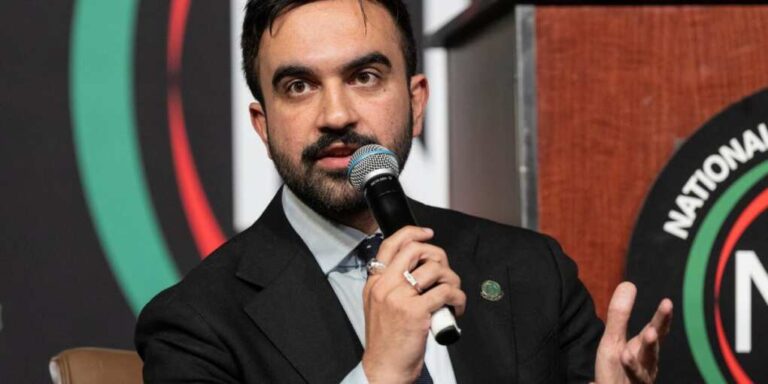
If you feel like New York is standing on a tilting deck, you’re not alone. A fresh Times/Siena survey puts Democrat Socialist Zohran Mamdani out front in a four-way fight for Gracie Mansion, with 46 percent of likely voters saying they’d back him. His coalition—young, highly educated, and ideologically left—hasn’t blinked at his hostile stance toward the city’s job creators or his refusal to condemn the loaded “globalize the intifada” slogan. Instead, they’re buying what he’s selling: soak-the-rich politics wrapped in culture-war radicalism.
How does a hard-left assemblyman become the likely next mayor of America’s biggest city? Two words: split field. Incumbent Eric Adams and former Governor Andrew Cuomo are competing for similar voters as independents, while Guardian Angels founder Curtis Sliwa carries the GOP banner. With the non-left fractured three ways, Mamdani can cruise with a fervent base and a plurality. The pollsters even gamed out a head-to-head: if both Adams and Sliwa stepped aside, Cuomo closes the gap to within striking distance—48–44—turning a coronation into a knife fight. But both have vowed to keep running.
This isn’t happening in a vacuum. New Yorkers have endured years of progressive experiments: no-bail giveaways, prosecutors who treat criminals like victims, and a City Hall that chased cops, investors, and families out the door. Mamdani’s pitch is more gas on the same fire—luxury taxes, hostility toward finance and real estate, and an activist posture on foreign causes that have nothing to do with safer subways or cleaner streets. He’s even signaled he’s “not particularly concerned” about crime, a statement that would have ended a campaign in saner times.
The consequences are obvious. You can’t tax-and-shame your way to prosperity in a city that runs on jobs created by entrepreneurs, financiers, restaurateurs, and small-business owners. You can’t sneer at law-and-order and expect families to stick around while repeat offenders run the trains. You can’t chant radical slogans and expect companies to expand payrolls in Midtown instead of Miami or Nashville. Elect Mamdani, and the exodus accelerates—rents, taxes, and disorder up; investment, tourism, and public safety down.
His supporters will say affordability is the issue driving this race. Fine—then start by enforcing the law so working New Yorkers aren’t paying a hidden “crime tax” in every commute and transaction. Streamline permitting, confront the nonprofit-industrial complex that milks billions while the streets decay, and stop treating landlords and small businesses as enemies. Real affordability begins with growth and safety—not a socialist wish list guaranteed to drive out the very people who pay for city services.
So what could actually stop this? Math. If anti-Mamdani voters coalesce behind a single alternative—most plausibly Cuomo—the race tightens overnight. That would require unusual discipline and self-sacrifice from Adams and Sliwa, who both insist they’re in to the end. Without consolidation, the Left wins on a split vote and claims a mandate it didn’t earn.
New York has been here before. The city flirts with ideological extremes, then remembers it needs cops who will be backed, streets that are clean, subways that feel safe, and a government that understands paychecks don’t grow on trees. If voters want a return to competence, they can still get there—but not by handing the keys to a socialist who thinks the problem with New York is that it hasn’t gone far enough left.
The waterline is rising. The lifeboats—law-and-order and pro-growth sanity—are still within reach. The question is whether enough New Yorkers climb in before the band stops playing.
